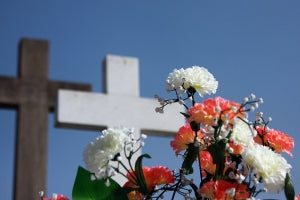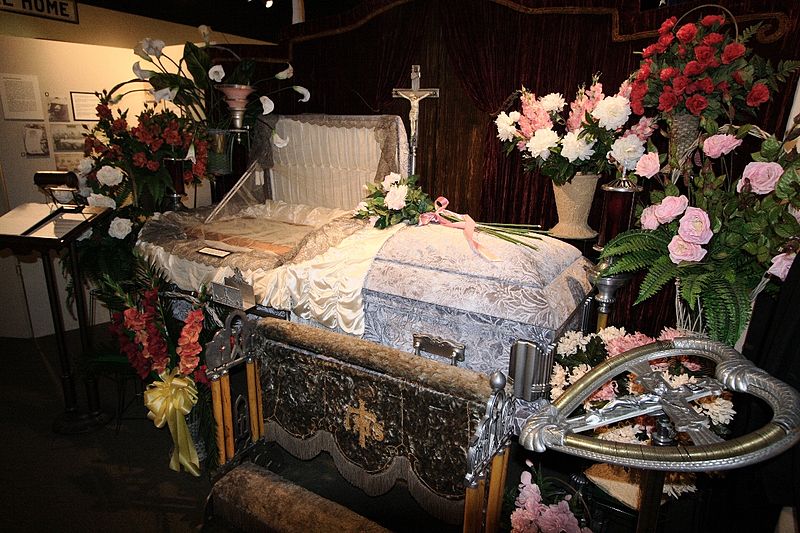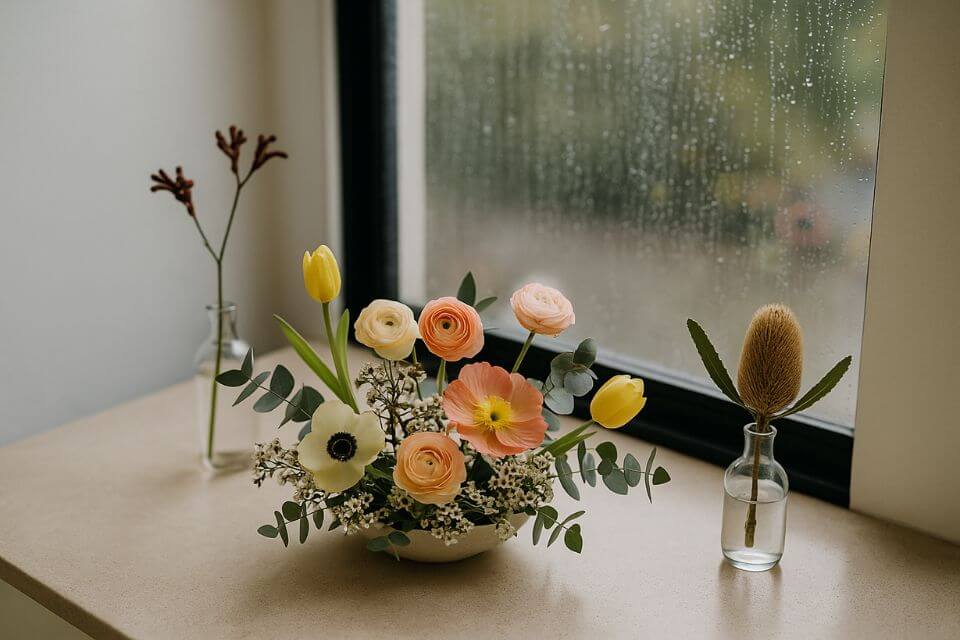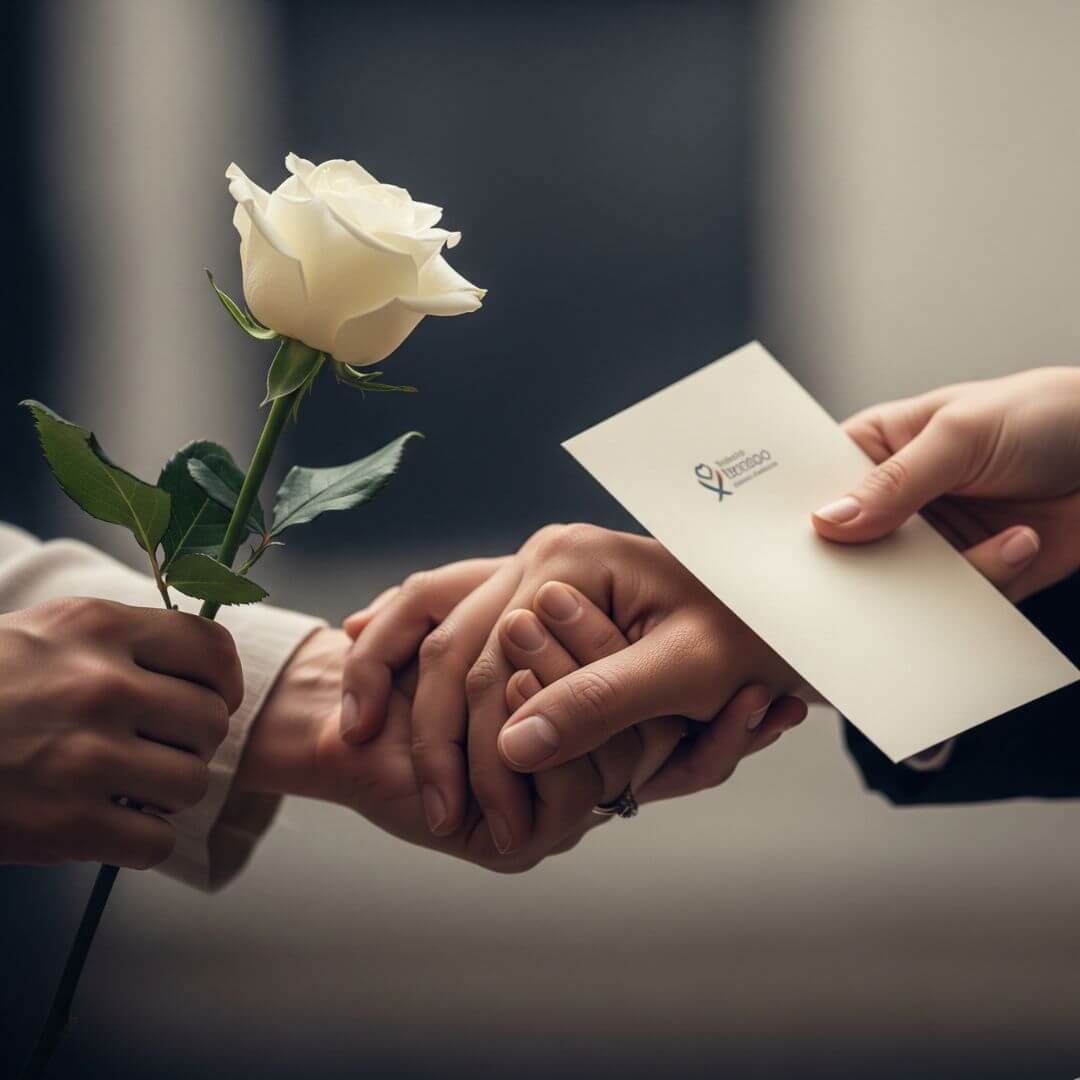In 1960, a team of archaeologists from New York's Columbia University were digging in a remote area in the Kurdistan region of Iraq, a place called the Shanidar Cave. They discovered a gravesite with nine Neanderthal skeletons in the cave. One of the graves had evidence of Yarrow, Ragwort, Grape Hyacinth, Bachelor’s Button, St. Barnaby's Thistle, Hollyhock , and Cornflowers. There in this grave, 60,000 years old, before modern humans had appeared, was the first evidence of a burial ceremony that included flowers.

It's natural that flowers would be used as a symbolic gesture at funeral ceremonies. All of the flowers discovered in the Shanidar find were thought to have medicinal powers, and the grave where they were found could have been a medicine man's remains, with his stock in trade buried with him, much like any other personal household items are found in ancient graves. In addition, flowers have long been associated with the passing of human life, a reminder that life is short and to be enjoyed while it's in full bloom.
Over the centuries, different cultures in different parts of the world have developed strikingly different burial rituals, but almost all of them feature flowers offered as a tribute to the deceased, and as a sign of respect to the deceased loved ones. Flowers are like people. They are beautiful, but their beauty is not made to last forever.
Before the advent of modern embalming techniques, flowers had a practical as well as symbolic use for wakes, funerals, and interment ceremonies of all kinds. They brought a fresh smell that helped to mask the odour of death while the deceased was prepared for burial and made available for viewing to mourners.
The In The Garden Movement
Early in the twentieth century, an American pharmacist named Charles Austin Miles composed the funeral hymn In The Garden, which quickly became a familiar hymn to millions around the world. The song didn’t just have an effect on the music played at funerals and wakes. Its garden imagery started a movement in mortuary practices and funeral flowers that were centered on displaying the departed love one reposing in a garden.
This In The Garden movement led to almost universal practice of funeral parlours becoming indoor gardens as a fitting backdrop for the display of the deceased during a period of bereavement before being interred. Many funeral chapels became a form of greenhouse, with live plants and flowers, and some even had birds flying around inside them. By mid-century, this had morphed into a temporary display of flowers given by friends and relatives of the deceased to surround the casket that we find so familiar today.
During the same period, a delightful tradition of transporting the flowers from the funeral home to the gravesite by a group of women led by what was affectionately called The Flower Lady. Flower ladies were the female equivalent of a pallbearer. Six men, chosen by close relation or other important social ties to the deceased would carry the coffin to the place of rest, and six women, led by The Flower Lady, would carry the flowers, then set them up at the cemetery in order to supply a backdrop for the completion of the ceremony there.
Flower ladies were selected with the same care and respect accorded to pallbearers, normally close friends of the family. It's one of the many ways neighbours and friends come together in a time of bereavement to help a grieving family tend to important matters that come with the death of a loved one.
The Modern Meaning Of Flowers For A Funeral
Flowers sent to honour the deceased are a means of expression for those that send them. Death and mourning are difficult concepts and sometimes it's hard for people to put their feelings into words. Sending or bringing flowers are an expression of sympathy, respect and love that require no further elaboration. They represent the wish of the donor to lend their support and to share the burden of grief. Thoughtful friends often send flowers to the home of the deceased as well, and to the church as a sign of respect for those that survive the deceased, and the community that supports them.
Giving flowers is a sign of sentiment. Sentiment is a manifestation of instincts, feelings, and ideals that aren't fully understood even by the person that feels them. Some form of sentiment for those that have lost a loved one, and for the memory of a departed friend or family member is a sign of a healthy respect for tradition and the feelings of other people. Respect for the dead is a very deep seated and important ideal. Flowers can help express that ideal in a non-verbal but unmistakable way.
For people of many faiths and traditions, flowers have deep and abiding symbolic meaning besides their significance as a respectful offering to the family of the deceased. Flowers represent both the fleeting nature of life, and its immortality. A particular flower does not last long, but we know that more flowers will come to replace it in their turn. They are a symbol of the end of life, and the beginning.
Why Flowers Are Still Important
The atmosphere created by a backdrop of flowers adds a feeling of respect, dignity, and consolation to a funeral service. Occasionally, well-meaning people instruct mourners to omit flowers in lieu of bequests to a favourite charity. This can put some mourners in an uncomfortable position of not wishing to offend the wishes of the family, but still desiring to express themselves in the traditional way to pay respects to the deceased.
The ceremonies held before the burial of a loved one are meant to create an image in time of the passing from one life to the next, and a beautiful and lasting image of the deceased, surrounded by the love and affection of family, friends, and neighbours. This memory can be made indelible by the beautiful sight and smell of fresh flowers placed around the gathering.
We offer a reliable delivery service to:
Send funeral flowers to Fremantle
Send funeral flowers to Perth
Send funeral flowers to Cockburn Central
Send funeral flowers to Karrakatta
Send funeral flowers to Rockingham
Send funeral flowers to Canning Vale
Send funeral flowers to Cannington
Send funeral flowers to Myaree
Send funeral flowers to Booragoon
Send funeral flowers to Subiaco
Send funeral flowers to Kelmscott
Send funeral flowers to Maddington
Send funeral flowers to Midland
Send funeral flowers to Australia





